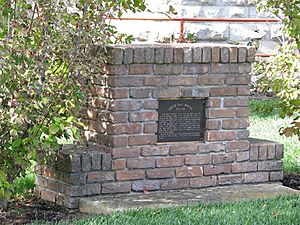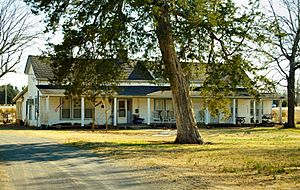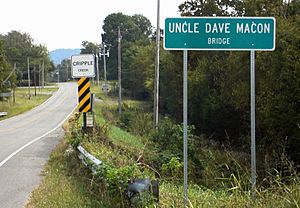Uncle Dave Macon facts for kids
Quick facts for kids
Uncle Dave Macon
|
|
|---|---|
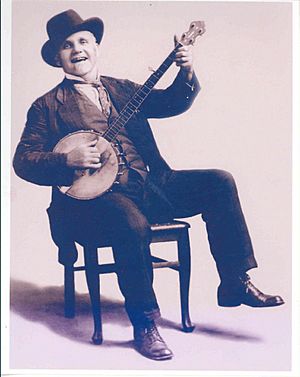 |
|
| Background information | |
| Birth name | David Harrison Macon |
| Also known as | "Dixie Dewdrop" |
| Born | October 7, 1870 Smartt Station, Tennessee, US |
| Origin | Nashville, Tennessee |
| Died | March 22, 1952 (aged 81) Murfreesboro, Tennessee US |
| Genres | Old-time music |
| Occupation(s) |
|
| Instruments | Banjo, vocals |
| Years active | 1920s–1952 |
| Associated acts | Fruit Jar Drinkers |
David Harrison Macon (born October 7, 1870 – died March 22, 1952) was an American musician. He was known as Uncle Dave Macon. He played the banjo, sang, wrote songs, and was a comedian.
People called him "The Dixie Dewdrop." He was famous for his chin whiskers, special hat, gold teeth, and unique collar. Uncle Dave became well-known in the 1920s as a vaudeville performer. Vaudeville was a type of live show with different acts like music, comedy, and dance. Later, he became the first big star of the Grand Ole Opry. This was a famous radio show for country music.
Many people see Uncle Dave Macon's music as a link between old 1800s folk music and the radio music of the early 1900s. A music expert named Charles Wolfe said that if Jimmie Rodgers is the "father of country music," then Uncle Dave Macon is the "grandfather of country music." Uncle Dave's exciting stage shows and fun personality made him a lasting figure in early country music.
Contents
Growing Up and Family Life
Uncle Dave Macon was born in Smartt Station, Tennessee. This was a small place near McMinnville. His father was John Macon and his mother was Martha Ramsey.
In 1884, when David was 13, his family moved to Nashville, Tennessee. They bought and ran a hotel called the Old Broadway Hotel. This hotel became a hub for David's love of music. Many traveling performers and circus acts stayed there. In 1885, he learned to play the banjo from a circus comedian named Joel Davidson. David went to Hume-Fogg High School in Nashville.
After his father passed away in 1886, his mother sold the hotel. The family moved to Readyville, Tennessee. There, his mother ran an inn for stagecoaches. David started to entertain the travelers at the inn. He played his banjo on a small stage he made.
In 1889, David married Matilda Richardson. They moved to a farm near Kittrell, Tennessee, and had six sons. Around 1900, Uncle Dave started a delivery business. It was called The Macon Midway Mule and Mitchell Wagon Transportation Company. He used mules to carry goods between Murfreesboro and Woodbury, Tennessee.
While working, he would often sing and play his banjo for people along his route. As his sons grew up, they joined the business. But when cars became popular, his mule company had to close in 1920.
Starting a Music Career
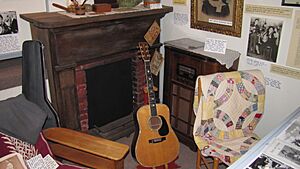
Uncle Dave Macon had always performed for fun, but his first paid show was in 1921. It was at a school in Morrison, Tennessee, to help raise money for a church. In 1923, he performed for a group called the Shriners in Nashville. A theater owner named Marcus Loew saw him. Loew offered him money to perform in a theater in Alabama.
Uncle Dave accepted the offer. After that show, he was asked to perform at another theater in Birmingham. He earned a lot of money each week. This led to more offers from other theaters. At 50 years old, Uncle Dave became a successful entertainer.
In 1923, Uncle Dave Macon started touring the southeastern United States. He traveled with a fiddler named Sid Harkreader and other performers. A furniture company that sold records, Sterchi Brothers Furniture Company, noticed him. They saw that he could be a great recording artist.
On July 8, 1924, Uncle Dave and Sid Harkreader made their first recordings. They recorded 18 songs in New York City. In 1925, they added "Dancing Bob" Bradford to their act. He was a buck dancer. Their shows now included comedy, dancing, and old-time music. Later in 1925, Uncle Dave met guitarist Sam McGee. Sam became Uncle Dave's main partner for recording and performing.
On November 6, 1925, Uncle Dave and Sid performed at the Ryman Auditorium. This place later became the home of the Grand Ole Opry. Their show was just three weeks before the Grand Ole Opry started.
Grand Ole Opry Star
Uncle Dave Macon was one of the first people to perform at the new WSM radio station. On December 26, 1925, he and fiddler Uncle Jimmy Thompson were on the WSM Saturday night show. Uncle Dave performed with WSM for 26 years. However, he was not a regular performer at the Grand Ole Opry because he was often touring.
In early 1927, Uncle Dave formed a band called the Fruit Jar Drinkers. The band included Uncle Dave, Sam McGee, Kirk McGee, and Mazy Todd. They recorded their first songs on May 7, 1927. They mostly played traditional songs and fiddle tunes. Sometimes, they recorded religious songs. For those, Uncle Dave changed the band's name to the Dixie Sacred Singers.
Uncle Dave recorded for different record companies over the years. He recorded with the Delmore Brothers in 1935. From 1930 to 1952, his son Dorris often played guitar with him. In 1940, Uncle Dave, along with Opry founder George D. Hay and star Roy Acuff, went to Hollywood. They were in a movie called Grand Ole Opry. The movie shows Uncle Dave performing, including a fun song with his son Dorris. In the song, 69-year-old Uncle Dave jumps up and dances!
Later, in the 1940s, Uncle Dave toured with Bill Monroe. But he was not very impressed by the new bluegrass style. He also didn't like the banjo playing of Monroe's bandmate Earl Scruggs.
Later Life and Legacy
Uncle Dave Macon kept performing until March 1, 1952. He passed away three weeks later, on March 22, 1952, in Murfreesboro. He was buried at Coleman Cemetery near Murfreesboro. More than 5,000 people came to his funeral.
In 1966, Uncle Dave was added to the Country Music Hall of Fame. A monument was built near Woodbury to honor him. His son Dorris and some bandmates, like Sam and Kirk McGee, sometimes performed at the Grand Ole Opry as the Fruit Jar Drinkers until the early 1980s.
Every July, the city of Murfreesboro holds "Uncle Dave Macon Days." This event takes place at Cannonsburgh Village. It hosts national contests for old-time clogging, buckdancing, and banjo playing.
Uncle Dave's old house, Uncle Dave Macon House, is still standing in Kittrell, Tennessee. It is listed on the National Register of Historic Places. In 2014, a bridge over Cripple Creek in Kittrell was named the Uncle Dave Macon Bridge.
Music and Performance Style
Uncle Dave Macon recorded over 170 songs between 1924 and 1938. But he was most famous for his exciting and lively stage shows. His bandmate Kirk McGee said that Uncle Dave was always performing, "All day long, from morning till midnight, it was a show."
When he played, Uncle Dave would often kick, stomp, and shout. This made it hard for the sound engineers at the radio station! You can hear his energetic style in his early recordings, where he yells and sings with a lot of power.
Uncle Dave was known for his funny and wild performances. He would tell jokes and funny stories. He also joked with his bandmates like Sam McGee and Sid Harkreader. Other country stars admired his talent. Roy Acuff said that Uncle Dave Macon was a truly unique entertainer who didn't copy anyone.
Uncle Dave played an open-backed Gibson banjo for most of his recordings. While some musicians at the time didn't think he was the best banjo player, experts today have found at least 19 different picking styles in his music.
Some of his favorite songs were "A Soldier's Joy," "Bully of the Town," "The Arkansas Traveler," and "Sail Away, Ladies." Uncle Dave said he learned "Rock About My Saro Jane" from workers along the Cumberland River in the 1880s. The song "Buddy Won't You Roll Down the Line" was inspired by a labor conflict in Tennessee. In "From Earth to Heaven," Uncle Dave sings about his days hauling goods for his company. His favorite hymn was "How Beautiful Heaven Must Be." This song is carved on his monument near Woodbury.
Albums
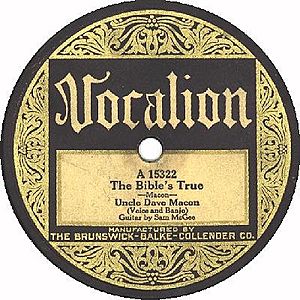
- Uncle Dave Macon (1963) (Folkways)
- First Featured Star of the "Grand Ole Opry" (Decca DL-4760)
- Country Gospel Song (1971) (Folkways)
- Early Recordings (Uncle Dave Macon) – County Records (1971)
- Go Long Mule – County Records (1972)
- The Gayest Old Dude In Town – Folk Variety Records (1973)
- At Home – Bear Family Records (1976)
- Laugh Your Blues Away – Rounder Records (1979)
- Keep My Skillet Good and Greasy – Old Homestead Records (1979)
- Country Music Hall of Fame Series – MCA Records (1992)
- Travelin' Down the Road – County/BMG Records (1995)
- Anthology of American Folk Music (1997) (Folkways)
 | Bessie Coleman |
 | Spann Watson |
 | Jill E. Brown |
 | Sherman W. White |


